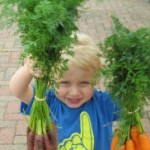Food connects to us to different cultural traditions and to the people, lands and waters in different parts of the world. The reverse is also true; travelling can make us miss all the foods of home. But, neither of these are permanent. Travel trips are typically short, and it can be exciting to try a new food or cuisine for one meal.
The reality for many immigrants and refugees to Canada is quite different. For these families, this is a permanent move to a new place with different food traditions. My mother came to Canada 47 years ago, but she still misses the food she grew up with.

Immigrants make a choice to come here and may be somewhat prepared for differences in food. Refugees have little choice of where they arrive. They are forced to flee their countries due to war, violence, or persecution (e.g., for political views, religion, gender or sexual orientation).
Food insecurity is often a factor in large-scale refugee crises. The recent economic crisis in Venezuela has caused widespread food insecurity and is one reason that so many people are leaving.[1][2] Some have suggested that food insecurity was part of the Arab spring uprisings in 2011[3][4] and the violence that followed. In addition, climate change is affecting food production around the world,[5] leading to food insecurity and social and political unrest.
It’s not surprising that most refugees experience some form of food insecurity, either when leaving their country or in refugee camps, but it’s also something they experience here. Refugees from racialized groups are more likely to encounter precarious employment and low incomes due to systemic racism. Immigrant support organizations and refugee sponsor groups do an excellent job of helping people navigate our systems, but it’s a big adjustment made harder by a lack of familiarity and learning English as an additional language.
 While everyone’s story is unique, refugee food experiences often go beyond being able to afford the foods they need and want. The familiar foods and ingredients from home may be hard (or even impossible) to get. Community and backyard gardens are a great way to grow different varieties of produce.
While everyone’s story is unique, refugee food experiences often go beyond being able to afford the foods they need and want. The familiar foods and ingredients from home may be hard (or even impossible) to get. Community and backyard gardens are a great way to grow different varieties of produce.
 Then, there’s the question of how to prepare locally available ingredients into tasty meals. When I lived in abroad, I encountered ingredients that we just don’t have here, so I had to experiment a lot to figure out how to best cook them; I had some real disasters!
Then, there’s the question of how to prepare locally available ingredients into tasty meals. When I lived in abroad, I encountered ingredients that we just don’t have here, so I had to experiment a lot to figure out how to best cook them; I had some real disasters!
Food is also a form of medicine. In many cultures, traditional cuisines include ingredients with healing properties, but in a new place with different food that benefit can be lost.
There is a lot that makes it hard for refugees to adjust to their food life here, but they also bring a lot of food-related skills and knowledge. Those from farming or fishing backgrounds are keen to put those skills to work. With an aging farming population, we need to cultivate the next generation of farmers. Immigrants and refugees may need support to access land and to understand how to farm in this climate, along with knowledge of the farming business in Canada, but many also bring the kind of farming practices that we need to adapt to a changing climate.

Some refugees may wish to share their food traditions through new food or restaurant businesses.[6] There are many more opportunities to connect food and livelihoods for refugees and immigrants for the benefit of everyone, including labour gaps.[7]
The diverse food experiences of refugees represents all of the complexities of our relationships with food – from health to culture to history to traditions to language to livelihoods to our futures.
Blog written by: Satya Ramen, Senior Coordinator, Our Food Project, Ecology Action Centre
Adventures in Local Food is your source for food news in Nova Scotia, from pickles to policy. It is a project organized by the Ecology Action Centre. Learn more about our program at https://www.ecologyaction.ca/ourfood
Or follow us on:
Twitter: @OurFoodProject and @EcologyAction
Facebook: The Ecology Action Centre
Instagram: ecologyaction



